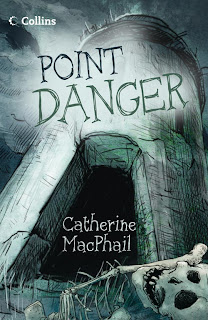
It’s the simple things that give us the best ideas for stories. I was walking along the street and I heard a boy talking on his mobile phone. All I could hear him saying was, ‘I know, I know, this is my last chance.’
I thought, ‘Last chance for what?’ You think about it:
His last chance to pay back money he owes? How is he going to get that money?
His last chance to get his place on the football team? What if he has a rival who will stop at nothing to keep him out of the team?
How many stories could you come up with using just those words? Last Chance. Here is the one I came up with:
What if you were always in trouble? It was never really your fault, and a school trip was your last chance to prove yourself. What if it was a school trip you didn’t want to go on, to a remote island, dominated by a crumbling lighthouse (I love lighthouses), with your least favourite teacher, and boys you didn’t like? You’re warned not to go near that lighthouse, but in the end, something is going to force you to ignore that warning.
What I have just written is a short synopsis of my book Point Danger.

That is how all my books start. Look at the synopsis. I already have the high points of the story:
The journey to the island (On a boat? Could there be a storm?)
The lighthouse dominating the skyline.
The description of the teacher.
The boys he doesn’t like.
What is going to make him disobey the teacher and go near the lighthouse?
And what is he going to find inside?
And most importantly, I have my hero, the boy who wishes he was anywhere else but here.
And in my head I heard a voice say, ‘I hate school trips.’ It was MacDuff.
I really believe that once you’ve got the voice, the character comes alive. And MacDuff came alive right then. I knew exactly what he would say about his teacher, Mr Hoss.
Perfect name, by the way – with a face like his, he should be wearing a saddle.
I knew what he would say when they reached the ‘hotel’.
‘This is a hut. H-U-T.’ I spelt it out.
In fact, because I could hear his voice, I could put MacDuff in any situation and I knew what he would say and how he would say it.
Here’s something for you to try:
Chelsea (remember, her with the chewing gum hair?) asks MacDuff to her birthday party. I know what he would say. Do you?
Chelsea? Asking me to her party? After what I did to her hair? Oh no, I don’t trust her. She’s up to something.
So go ahead. Write about what happens at the party, in MacDuff’s voice.
Cathy MacPhail has written over forty books for children, as well as plays for radio and short stories. She has a reputation for ‘gritty realism’, but loves writing funny books as well as ghost stories. Her first book, Run Zan Run, was inspired by the bullying her daughter suffered in high school. Many of her books have won awards, and she loves visiting schools to talk to her readers. She still lives in Greenock, in Scotland, where she was born.
Don’t forget about the free Point Danger activities as well: a classroom speed quiz and a look at plotting tension in the book.


